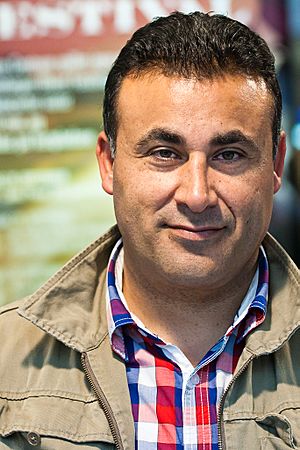Naser Khader facts for kids
Quick facts for kids
Naser Khader
|
|
|---|---|
 |
|
| Member of the Folketing | |
| In office 18 June 2015 – 1 November 2022 |
|
| Constituency | Zealand (from 2019) East Jutland (2015—2019) |
| In office 20 November 2001 – 15 September 2011 |
|
| Constituency | Copenhagen (2007—2011) Østre (2001—2007) |
| Leader of New Alliance | |
| In office 7 May 2007 – 5 January 2009 |
|
| Succeeded by | Anders Samuelsen |
| Personal details | |
| Born | 1 July 1963 Damascus, Syria |
| Nationality | Danish |
| Political party | Independent (2021–present) |
| Other political affiliations |
Social Liberal Party (1984–2007) New Alliance (2007–2009) Conservative People's Party (2009–2021) |
| Domestic partner | Bente Dalsbæk (until 2010) |
| Children | 2 |
| Occupation | Senior Fellow of Hudson Institute Middle East expert and TV commentator Radio host |
| Profession | Cand.polit. |
| Signature |  |
| Website | Khader.dk |
Naser Khader (born July 1, 1963) is a Syrian-Danish politician who served in the Folketing, Denmark's parliament, for many years. He is known for his work on immigration and for starting his own political party.
Khader was first elected to parliament in 2001. Over his career, he was a member of several different political parties. In 2007, he even started his own party called New Alliance, which won five seats in the parliament. He later joined the Conservative People's Party. In 2021, Khader became an independent politician and announced he would not run for re-election.
He is a strong supporter of democracy and freedom of speech. In 2008, he co-founded a group called Democratic Muslims to encourage peaceful discussions about Islam. In 2023, Khader converted to Christianity.
Naser Khader has been named one of the most influential Danes of the 20th century and one of the world's 500 most influential Muslims.
Contents
Early Life and Background
Naser Khader was born in Damascus, the capital of Syria. His father was Palestinian and his mother was Syrian. He grew up in a small village near Damascus. Because his father was a Palestinian refugee, it was hard for him to find good work in Syria.
In the 1960s, Khader's father moved to Europe to find work. In 1974, when Naser was 11, he and his family moved to Copenhagen, Denmark, to join his father. He went to school in Denmark and graduated from Rysensteen Gymnasium in 1983.
Political Career in Denmark
Naser Khader was first elected to the Danish Parliament, called the Folketing, in 2001. He quickly became known for his ideas on how to help immigrants become part of Danish society.
The 24-Year Rule
One of Khader's most famous ideas was the 24-year rule. He suggested this rule in 2000 to help prevent forced marriages. The rule stated that if a Danish resident wanted to bring a spouse from outside the country to live in Denmark, both people had to be at least 24 years old.
The rule was passed into law in 2002. It was a big change to Denmark's immigration laws. A 2023 study showed that the rule led to fewer marriages for family reunification. It also found that young women who grew up after the rule was passed tended to marry later, get more education, and choose partners they met in Denmark.
The Muhammad Cartoons Controversy
In 2005, a Danish newspaper called Jyllands-Posten published cartoons of the Islamic prophet Muhammad. This caused a major international event known as the Muhammad cartoons controversy. Khader believed in freedom of speech and supported the newspaper's right to publish the cartoons.
Because of his views, he received serious threats. Ahmed Akkari, a spokesman for a group of Danish imams, made a threatening statement about what might happen if Khader became a government minister. This made Khader think about leaving politics, but he decided to stay.
Starting a New Political Party
In 2007, Khader left his political party, the Social Liberal Party. He said he was frustrated that many party members did not strongly defend freedom of speech during the cartoon crisis.
He decided to start his own party called New Alliance (which later became Liberal Alliance). His goal was to create a party that put democratic values first. In the 2007 election, his new party was successful and won five seats in parliament. This was a big achievement for a brand-new party.
After a while, Khader left the party he created. He was an independent politician for a short time before joining the Conservative People's Party in 2009.
The Burqa Ban
In 2009, Khader suggested a law to ban the wearing of the burqa and niqab in public. He said these face-covering veils were "un-Danish" and a form of "oppression of women."
The idea was debated for many years. Finally, in 2018, the Danish parliament passed the law, which is often called the Burqa Ban. The law bans any garment that covers the face in public places.
Leaving Politics
Khader lost his seat in the 2011 election. He then worked for the Hudson Institute, an American research organization. He successfully ran for parliament again in 2015 and was re-elected.
In 2021, Khader left the Conservative People's Party to become an independent member of parliament. He also announced that he would not run for re-election in the future, marking the end of his long political career.
Honours
 | Madam C. J. Walker |
 | Janet Emerson Bashen |
 | Annie Turnbo Malone |
 | Maggie L. Walker |

